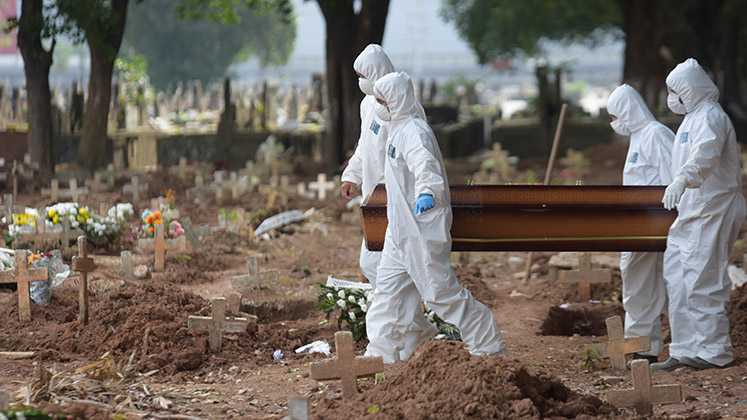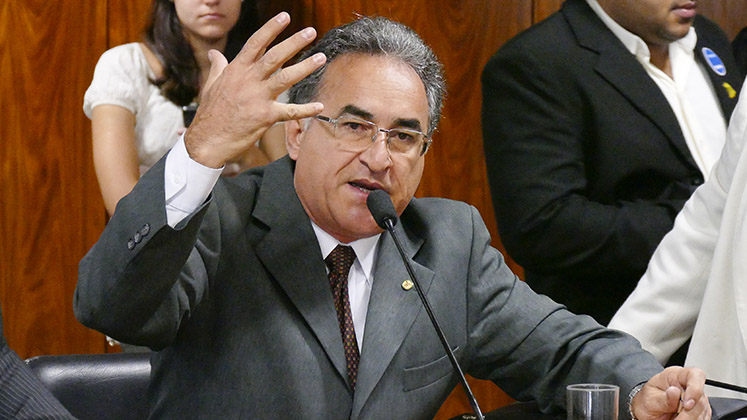Despite being relatively well-placed to combat COVID-19, Brazil now has one of the highest death rates in the world. Often seen as a problem of coordination between levels of government, the real issue has been federal-level failures that stem back to a pre-existing political crisis. This catastrophic, top-down mishandling of the pandemic has effectively neutralised the strengths and often heroic efforts of the national healthcare system, write Gabriela Lotta (FGV), Michelle Fernandez (Universidade de Brasília), Deisy Ventura (Universidade de São Paulo), Danielle Rached (FGV), Melania Amorim (Universidade Federal de Campina Grande), Lorena Barberia (Universidade de São Paulo), Tatiane Moraes (Fiocruz), and Clare Wenham (LSE Health Policy).
• Também disponível em português
Eight months into the pandemic, more than 160,000 Brazilians have died from COVID-19, which represents the fourth highest per capita death rate in the world (as of 12 November). Yet even today, there is no sign that the government is getting the virus under control. How can we explain this massive human tragedy and finally change its course?

Was Brazil well-placed to deal with COVID-19?
It is important to realise that Brazil was relatively well equipped to face the pandemic when it first arrived in Latin America.
First, Brazil has a strong national health system (the Sistema Único de Saúde, or SUS), which was established in the early 1990s. Despite chronic underfunding, the SUS has successfully expanded access to health services, mainly through the Family Health Strategy. As universal health coverage has been shown to be a key determinant in managing the pandemic, Brazil was well-placed to prevent, detect, and respond to the crisis.
Second, Brazil has recent experience of epidemics, including yellow fever and Zika. These outbreaks highlighted the benefits of an SUS primary healthcare system that reaches deep into Brazil’s territory to cover 74% of the population, with family health teams tackling health conditions on the ground and at local level. The work of the 286,000 community health workers on the front lines of the country’s COVID-19 crisis has been noted by the national and international community, particularly because of their close and ongoing relationships with local families and their apparent success in fighting the pandemic. The SUS also has a strong track record and significant expertise in epidemiological surveillance, not least because its health system dataset (DATASUS) provides rich and relevant information on national health and access to healthcare.
The political roots of Brazil’s failed COVID response
But if Brazil was in a relatively strong position, what went wrong once COVID-19 arrived? Crucially, the problem was not the health system, but rather a pre-existing political crisis that was exacerbated by the pandemic.
Where usually we might expect a crisis to provoke a national pulling-together, instead we see increasing political (and epidemiological) polarisation. On the one hand, the federal government has taken a laissez-faire approach, with its few and minor public health interventions apparently secondary to its desire to keep the economy ticking over. On the other, numerous state and municipal administrations have sought to protect their constituents through public health measures, but these have then been perceived as political opposition by the Bolsonaro government.
But make no mistake, this is not simply an absence of coordinated action to combat the pandemic: the federal government deliberately acts to spread the disease. The president in particular has encouraged people, and especially the most vulnerable, to expose themselves to the virus.
“So what?” Bolsonaro asked after 5,000 deaths. “What are you afraid of? Face it!”, he commanded when we reached 91,000 deaths; after all “everybody dies”. At 100,000 deaths, he felt only that “we have to go on”. And days ago, with 162,000 Brazilians dead, he used a ceremony at the presidential palace to warn that “we can’t run away from it, run away from reality; we have to stop being a country of faggots”.
Against all public health advice, he encourages large public gatherings; he meets people without wearing a mask; he promotes the use of unproven medicines; and, more recently, he has even begun to make speeches that discourage people from participating in any future vaccination campaign. These populist, anti-science positions divide society even more, and at significant human cost.

Prioritisation and neglect
Up until July, the federal government had invested only 30% of the emergency resources available for health policies. Priority emergency assistance also went to large companies at the expense of small and medium-sized firms, whereas disbursement of the emergency cash transfer programme for the socially vulnerable was both late and ineffective.
In terms of monitoring and understanding the virus’s spread and impact, the Ministry of Health has failed to produce systematic and timely indicators that would allow decision makers to coordinate a more effective response. Federal data continues to lack coherence with other sources, and many important data are not even collected. Epidemiological surveillance has also been negligent. The federal government has opted for “rapid” serological tests instead of RT-PCR, though the latter represent the most effective means of diagnosing COVID-19.
Together, these actions of the federal government have made Brazil’s response to the pandemic one of the very worst in the world.
The World Health Organization suggests that the rate of positive COVID-19 results should not exceed 5% of tests over a period of 14 days, but the rate in Brazil was 33.2% in August, which is the second highest positivity rate in the world. Brazil also has the highest death rate of nurses infected by COVID-19 and the highest number of maternal deaths linked to COVID-19, with most owing to serious failures of care. These deaths have been described by researchers in mortality studies as state-led feminicide.
In rural areas, the prevalence of COVID-19 is also increasing rapidly, with an alarming mortality rate and the collapse of local health systems. By 11 November 2020, 871 indigenous people had died from COVID-19, and there were 38,978 confirmed cases, which many commentators have seen as a form of genocide.
Overall, the Brazilian tragedy is explained mainly by federal-level failures, which effectively neutralised the strengths of the SUS. Just as important as the vaccine itself will be our efforts to immunise the SUS against the ravages of successive governments, which ultimately hurt the Brazilian people.
Though we may be embarrassed by our government, we are proud that the SUS still resists, managing at least to prevent this top-down catastrophe from taking the lives of even more of our fellow citizens.
Notes:
• The views expressed here are of the authors rather than the Centre or the LSE
• Please read our Comments Policy before commenting






At end November Brazil’s per capita death rate is now tenth highest in the world. In the region, Peru, Argentina and Mexico have higher rates of death. Outside of Asia, as time passes countries are ending up with approximately similar outcomes in terms of deaths per capita. There are exceptions but these appear to be due to structural differences within countries, such as the degree to which the elderly are institutionalised rather than short term government actions. Also, whether a country has had “good” or “bad” flu seasons recently. The UK had high excess deaths in the winter of 2017/18 and two winters of low excess deaths.
This blogpost is a great attempt to highlight Bolsonaro’s responsibility and its tragic consequences in Brazil. However, I think it offers a rather uncomplete picture for three reasons. Other countries, with a medium or even high-quality health system, had also suffered a lot (Peru, Argentina, but also Spain or Italy), so the quality and the access to the health system is not always a good predictor for the collapse (some African countries provide some food for thoughts as counterfactuals). Bias against science or the absence of shared scientific culture can hardly be a necessary condition for poorly timed decisions (consider the UK and its relative disaster). When we can compare excess mortality rate instead of the rate “covid-19-related death per capita”, we might get a more precise picture of which countries did well and which one are the true laggards. Would anyone be surprised if sub notifications of death occurred in Brazil because of uneven testing strategy? But blaming only one person for a whole failure seems deeply unrealistic to me. It presents some easy shortcuts while there are so many things we have to learn about this crisis.